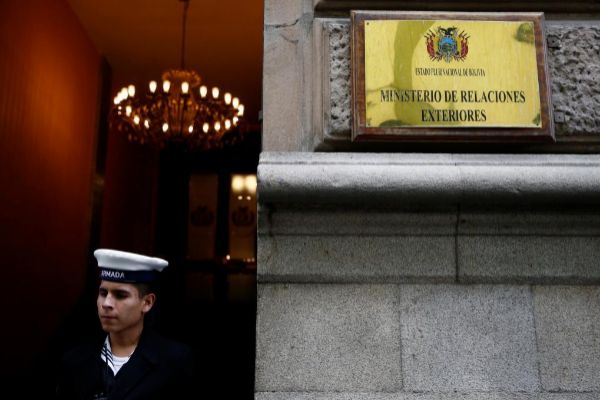- Diplomacy: The EU rejects Bolivia's decision to expel two Spanish diplomats from the country
- Latin America: Morales' lawyers warn that "Bolivia is outside the international system"
The provisional Government of Jeanine Áñez has decided to send to Madrid the 'number two' of its Foreign Ministry in its eagerness to "redirect" diplomatic relations with Spain, after the serious rifirrafe of the end of the year. This is Vice Chancellor Gualberto Rodríguez , an experienced diplomat who will go from the Foreign Ministry to become the person in charge of Business in Spain, after the three expulsions decreed by Madrid in reciprocity to the two carried out by La Paz.
"Bolivia wishes to overcome this impasse as soon as possible and maintain close relations with the Kingdom of Spain, within the framework of traditional respect and friendship that has always characterized them," the Foreign Ministry said in a statement. A crisis that is intended to be resolved in a fulminating way despite the unknowns still pending, opened by the actions of the two Spanish diplomats who went to the residence of the Mexican ambassador and the accusations, without providing a single proof, of the Bolivian Government. From the first moment of the transition process in the Andean country, and especially in the most critical initial moments, Spain has been part of the group of mediators together with the Catholic Church, the UN and the European Union.
The Spanish Government has not officially pronounced on what it considers an attempt to fix a conflict created by the Bolivian Executive itself, according to sources from the Ministry of Foreign Affairs. Madrid expects new gestures of relaxation and Rodriguez's arrival in Spain to redirect the situation.
The expulsion of Spanish diplomats Cristina Borreguero , in charge of Business and number one of the Embassy in the absence of the ambassador, and the consul Álvaro Fernández also provoked a strong response from the European Union, which made public its "deep concern about the escalation of tension diplomatic "after the" extreme and unfriendly "measure of the Bolivians. The European delegation in La Paz yesterday received explanations from the chancellor, Karen Longaric , who at the moment seems to please Brussels, also seeing the last movements of Áñez.
"It was a very open and constructive dialogue, that helps. Meanwhile our relationship with the Government is very good," said Jörg Schreibers , deputy head of the delegation. Europeans were interested in electoral preparations and ratified their decision to support the process.
In the next few days, the date of the new general elections will be finally known, probably between April and May, following the advances of the last weeks in the formation of the Supreme Electoral Tribunal (TSE) and the departmental courts. The Movement To Socialism (MAS) will finally participate in the elections with its own acronym, following the unanimous decision of the TSE.
The new Government yesterday received in La Paz the support of VOX leaders Victor González and MEP Hermann Tertsch , who pledged to investigate "until the last consequences" the "run over" the sovereignty of the Andean country. After a meeting with the Ministers of Interior and Defense, both politicians have shown their interest in knowing what relations the nine collaborators of Evo refugees have in the Mexican Embassy with the former president of the Government, José Luis Rodríguez Zapatero ; with the leader of Podemos, Pablo Iglesias , and with former judge Baltasar Garzón .
According to the Bolivian administration, these links would be key to explaining the presence of "masked" Spaniards in the immediate vicinity of the Mexican Embassy.
Interior sources and the agents of the Special Operations Group (GEO) have explained that the Spanish police came to pick up the diplomats, part of their daily routine in La Paz and other troubled countries, and that they were not immersed in any extraction operation of the leaders of the Socialism Movement (MAS).
After a week of events, the diplomatic armistice with Spain has not diminished , much less, the tension between Bolivia and Mexico. "If we surrender these people (the nine leaders of the indigenous revolution), we would be ending the right of asylum that for Mexico is sacred, is part of international law," said President Andrés Manuel López Obrador after meeting with the expelled ambassador .
According to the criteria of The Trust Project
Know more- Spain
- Mexico
- European Union
- Bolivia
- José Luis Rodríguez Zapatero
Interview Jorge 'Tuto' Quiroga: "The governance of Spain cannot be done at the expense of Bolivia"
Diplomacy Bolivia declares diplomats and GEOs who went to the embassy "non-gracious people"
Bolivia Denounce Bolivian Government Misinformation Maneuvers in the GEO Incident

